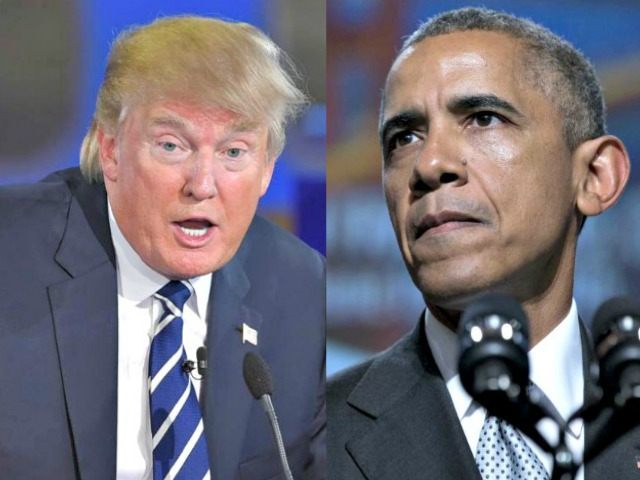When President Obama came into office in 2009, his party held commanding majorities in both houses of Congress. By the time he left, they had hemorrhaged dozens of House and Senate seats, and nearly 1,000 seats in State houses around the country. Obama may have beat Romney in 2012, but voters were sending a clear message about which party they wanted passing the laws.
Still, Obama had no intention of “waiting for legislation” when it came to his agenda. “I’ve got a pen and I’ve got a phone,” he declared.
Ignoring the fact that gridlock between the executive and legislative branches is not a defect in America’s government, but an essential component, Obama figured the elected representatives of the people would be no match for his executive orders.
Certainly, the executive order is a legitimate constitutional tool at the president’s disposal. Presidents frequently use them to direct federal departments, and to implement Congressional statutes. Few criticized Obama’s mere use of executive orders, or even the number he issued. The problem was always their brazen unconstitutionality.
Take for example Obama’s executive order on immigration. Congress had been debating “comprehensive immigration reform” ad nauseam for decades, with attempts to pass major legislation failing in 2007, and again in 2013.
Growing restless, Obama issued an executive order in 2014 that would have delayed deportations of 5 million illegal immigrants. Twenty-six states filed for injunction, arguing that the order violated the Administrative Procedures Act.
The Supreme Court would deadlock 4-4, effectively blocking Obama’s executive amnesty. But the issue raised before the Court was telling. For perhaps the first time in American history, the Supreme Court reviewed whether a president had violated the Take Care Clause of the Constitution.
Article II, section 3, reads in part that the president “shall take Care that the Laws be faithfully executed.” The obscure clause serves as a bulwark against monarchical suspensions of law, while imposing on the President an affirmative duty of faithful execution of the law.
Despite campaigning on reversing President Bush’s policy of “trying to bring more and more power into the executive branch and not go through Congress,” it appeared Obama was issuing orders in lieu of legislation.
Curiously, now that Obama is no longer president, the left is once again interested in executive overreach.
In his first few days in office, President Trump fired off a barrage of executive orders. But while Trump’s orders are worthy of debate as matters of executive policy, they so far have not created new law.
Yet, reactions have been apoplectic.
When Trump issued a temporary freeze on travel from seven Middle East countries, protesters rushed to the airports to stop this “Muslim ban.” Where were these people when Obama was openly writing his own laws?
Trump’s order broadly restricts citizens of Iraq, Iran, Syria, Yemen, Sudan, Somalia, and Libya from entering the U.S. for the next 90 days, and suspends all refugees for 120 days.
It was the Obama administration that first identified these countries as areas of terrorist “concern.” In 2015, the administration required persons who had travelled to these countries in the previous 4 years to apply for a visa before entering the United States. Obama also blocked Iraqi refugees for six months in 2011, after discovering Al Qaeda terrorists living as refugees in Kentucky.
Trump’s restrictions are certainly broader than Obama’s visa restrictions, and many criticized Trump’s order as it applied to permanent U.S. residents holding green cards. But that is a question of policy, not constitutionality.
For one, the order says nothing about banning Muslims, and it affects the same seven Muslim-majority countries as Obama’s visa restrictions. It does not affect some-40 other Muslim-majority countries. If Trump’s order singling out these seven countries amounts to religious discrimination, then so did Obama’s visa restrictions. Others say the order religiously discriminates because it prioritizes refugees of a minority religion. But prioritizing classes of refugees isn’t a novel policy. In 2015, the Obama administration declared its preference for refugees “deemed to be the most vulnerable,” including minorities, “whether that’s a racial minority or an ethnic minority or a religious minority, or even … an LGBT person.”
Moreover, the Immigration and Nationality Act expressly authorizes the president to suspend immigration in furtherance of public safety, or national security. Indeed, national security policy is indisputably within the president’s constitutional authority. In the order, Trump cites national security for these temporary restrictions.
As a matter of fact, Obama cited national security when he placed restrictions on visas for these same countries, and when he halted Iraqi refugees. So did President Carter in 1980, when he restricted visas to Iranians. So did several other presidents in the numerous other times immigration restrictions were placed on specific countries.
Last Friday, U.S. District Judge James Robart issued a nationwide injunction against the ban. In his brief ruling, Judge Robart does not address any constitutional issues, and merely finds that the State of Washington met its minimum burden. Yet, on the same day, a federal judge in Boston reached the exact opposite conclusion, ruling against the ACLU’s similar attempt to block the travel ban.
Robart’s nationwide injunction now goes to the Ninth Circuit Court of Appeals. No matter the outcome, it is hard to imagine a scenario in which this does not reach the Supreme Court.
Nationwide injunctions were issued several times against the Obama administration, including for his ill-fated executive amnesty. But while the Constitution does not authorize the president to write new laws, or extend legal status to 5 million non-citizens, it certainly grants the president substantial authority where national security is concerned.
Perhaps a few federal judges think they have a “pen and a phone” too?

COMMENTS
Please let us know if you're having issues with commenting.